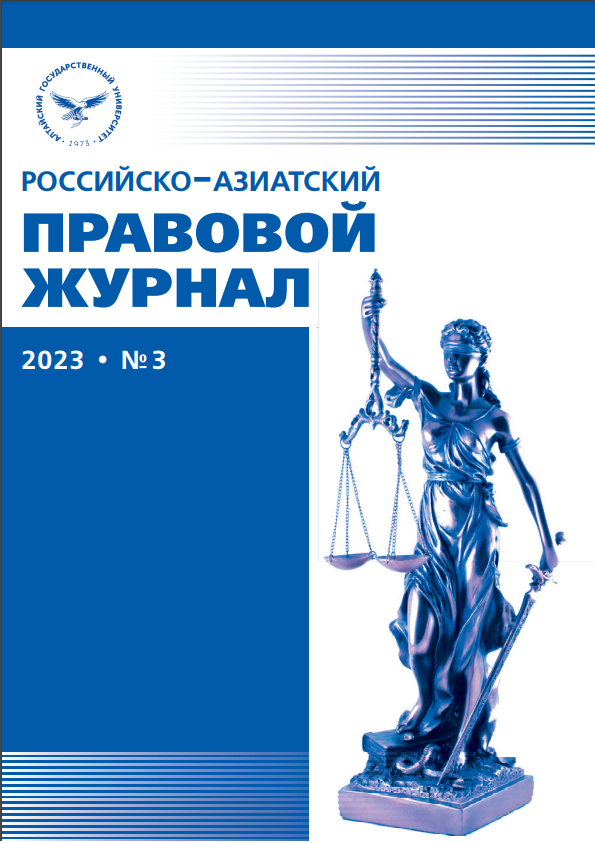ANTI–CORRUPTION EDUCATION IN HIGHER EDUCATION INSTITUTIONS
УДК 340.1 ББК 67.401.02
Abstract
Despite the formation of the legal and organizational foundations for the fight against corruption, theproblem of corruption continues to worsen. The article is devoted to topical issues of combating corruptionin the field of education, attention is paid to the useful experience gained at the Altai State University indeveloping new approaches to preventing negative situations in the educational field. The university activelycarries out anti-corruption education and anti-corruption training of employees and students. At the sametime, countering corruption in the field of education requires further improvement of regulatory legal actsand the introduction of new tools and methods.
Downloads
References
Григорьева В. В., Струков Г. Н. Формирование антикоррупционного поведения в высших учебных заведениях как компонент обеспечения экономической безопасности страны // Воронежский государственный университет инженерных технологий. Воронеж, 2017. URL: https:// cyberleninka.ru/article/n/formirovanieantikorrupdionnogo-povedeniya-v-vysshih-uchebnyh -zavedeniyahkak-komponentobespecheniya-ekonomicheskoy-bezopasnosti/viewer
Леонтьева Э.О. Институализация неформальных практик в сфере высшего образования : дисс. … д-ра социол. наук: 22.00.04. Хабаровск, 2010. 352 с.
Митин А. Н. О контроле за рисками коррупционного свойства в сфере высшего образования // Уральский государственный юридический университет. Екатеринбург, 2018. URL: https://cyberleninka.ru/article/n/o-kontrole-zariskami-korruptsionnogo-svoystva-v-sfere-vysshego-obrazovaniya/viewer
Носакова Е.С. Формирование антикоррупционного правосознания в системе мер противодействия коррупции // История государства и права. 2012. №9. С. 23–29.
Обращение Президента Российской Федерации — стенограмма // Российская газета. URL: https://rg.ru/2022/02/21/obrashchenie-prezidentarossijskoj-federacii-stenogramma.html
Повный Д.А. Административные процедуры как средство противодействия коррупции в образовании Российской Федерации : автореф. дисс. … канд. юрид. наук: 12.00.14. Челябинск, 2011. 23 с.
Пугач В.Н. Взаимодействие качества образования и экономической безопасности вуза : дисс. … канд. экон. наук: 08.00.05. М., 2010. 164 с.
Сергеева Ю.С. Формирование у студентов — будущих бакалавров юриспруденции компетентности в сфере противодействия коррупции : дисс. … канд. пед. наук: 13.00.08. М., 2018. 220 с.
Хайрутдинова Л. Р. Антикоррупционное образование в образовательной системе в России // Научно-исследовательский институт противодействия коррупции Казанского инновационного университета им. В. Г. Тимирясова. Казань, 2017. URL: https://cyberleninka.ru/article/n/antikorruptsionnoe-obrazovanie-v-obrazovatelnoy-sistemerossii/viewer
Russian-Asian Law Journal is a golden publisher, as we allow self-archiving, but most importantly we are fully transparent about your rights.
Authors may present and discuss their findings ahead of publication: at scientific conferences, on preprint servers, in public databases, and in blogs, wikis, tweets, and other informal communication channels.
Russian-Asian Law Journal allows authors to deposit manuscripts (currently under review or those for intended submission) in non-commercial, pre-print servers such as ArXiv.
Authors who publish with this journal agree to the following terms:
- Authors retain copyright and grant the journal right of first publication with the work simultaneously licensed under a Creative Commons Attribution License that allows others to share the work with an acknowledgement of the work's authorship and initial publication in this journal.
- Authors are able to enter into separate, additional contractual arrangements for the non-exclusive distribution of the journal's published version of the work (e.g., post it to an institutional repository or publish it in a book), with an acknowledgement of its initial publication in this journal.
- Authors are permitted and encouraged to post their work online (e.g., in institutional repositories or on their website) prior to and during the submission process, as it can lead to productive exchanges, as well as earlier and greater citation of published work (See The Effect of Open Access).








